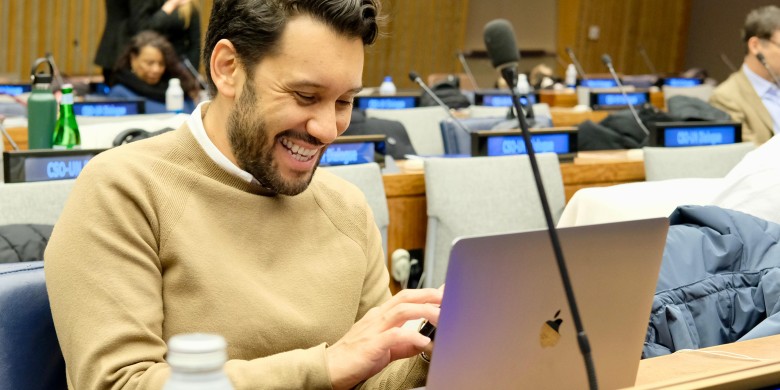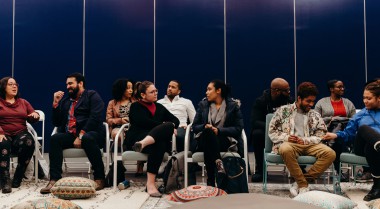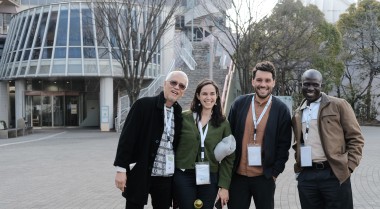What impact does the CSO-UN Dialogue on Peacebuilding have on local peacebuilders?
The cafeteria on the 4th floor in the Secretariat Building of the UN, a place that can be a bit of a maze for those unfamiliar with the premises, was sunlit and bustling as we sat down for lunch during the first day of the second CSO-UN Dialogue that took place on 12 and 13 December 2024.
However, the conversation was far more vibrant than the room itself. Across from each other sat Luis from Mexico, animated and engaging, speaking with the energy of someone who thrives on meeting people. Then there was Ahmed from Somalia, who took his time to consider his words, speaking slowly and deliberately. And finally, there was Lukudu from South Sudan, who despite his airline losing his luggage, carried the calmness of someone accustomed to making the best of unexpected situations. Though they had never met before they quickly ended up in an engaging discussion about the value and impact of having so many GPPAC members/local peacebuilders gathered in New York. I simply could not resist pulling out my blue-striped notebook and GPPAC-branded pen to take notes of their exchange.
At the Heart of the Dialogue: Where Do Real Connections Happen?
Luis, who had attended the inaugural CSO-UN Dialogue in 2023, reflected on the differences between this year’s and last year’s events. "You can see that a lot more has been done in organisational terms." However, for him, the true value wasn’t in the formal agenda, which, for the first time, included a focused discussion on conflict prevention and shifted from static panels to interactive breakout groups—but in the informal moments of connection, like chatting over lunch or coffee. As he put it, "That’s the value of being here together, the value of our network members coming together, because let’s be honest, we know we won’t solve the big crisis during this two-day Dialogue. The impact lies in the inspiration we draw from each other during side-conversations like this." He laughed, a knowing smile on his face, before taking a bite of his food.
Ahmed, from Somalia, nodded in agreement, saying, "It’s wonderful to meet in person. It feels so good to put a face to a name and hear from others about what’s going on in their countries." Lukudu, from South Sudan, added with a grin, "How else could I have met him?" pointing at Luis. The value of connecting with GPPAC members from around the world was unmistakable. Being part of the GPPAC network becomes a shared starting point for meaningful conversations and a safe space to exchange experiences. They immediately have something in common and know they can trust each other to speak freely.

Locally Led, Globally Connected: The Value of the GPPAC Network
Snacking on the vinegar chips Luis had put on the table for everyone to enjoy, Lukudu shared that the CSO-UN Dialogue was a chance to feel closer to and better understand the UN, which often feels distant from his reality in South Sudan. "For us in South Sudan, the UN feels very far away. But here, you get to know people, also within the GPPAC network, who work with the UN every day. And I feel more part of GPPAC now after this," he shared thoughtfully. This observation is insightful on two levels. First, it highlights that being part of a network requires ongoing nurturing. Bringing members together in person creates opportunities for deeper connections and spontaneous side conversations that simply aren't possible in an online space. These interactions, in turn, foster trust and strengthen connectivity. For instance, now that the ice was broken, they confirmed their intentions to reach out directly to each other on peacebuilding matters in the future. Secondly, it emphasises GPPAC’s bridging role between the local and the global level, empowering members to engage with the UN more effectively and feel connected to global processes by collaboratively breaking down those processes into relatable concepts at the local level.
Both Luis and Ahmed highlighted the power of the network, especially the fact that GPPAC is locally led and locally owned. "I am the network. I don’t expect it to give me something in return," Ahmed remarked. This was echoed by Luis, who described the importance of meeting GPPAC members and other peacebuilders “It brings perspective on what is happening in other places. To understand that we operate in a broader system. How does what happens in one country relate to mine?"
Luis went on, "It brings joy being here! That’s so important. Somalia, South Sudan, Mexico—these are the places where a lot of violence is happening. We are drowned by conflict, and it is easy to get drowned by hopelessness. The network gives us a connection around a shared purpose and it gives us perspective. So hearing about others’ work, even their smallest victories, brings joy, because a victory is a victory, right? This joy to me is very impactful because it gives me the energy to continue."
True Impact: Peacebuilding Inspiration and Energy Beyond the Dialogue
What stood out after Luis’s inspiring words? The true impact of GPPAC members coming together during the second CSO-UN Dialogue lies in these off-the-agenda moments—like those spontaneous conversations over lunch. The fact that Luis, Ahmed, and Lukudu are part of the GPPAC network automatically created a sense of connection, belonging, and trust.
As the three men gathered their things to leave the cafeteria, it was obvious that what they were taking away from their time in New York was more than attending an event — it was a renewed sense of belonging, inspiration, and hope. It was a reminder that, while the challenges they face may seem insurmountable, they are not alone in their efforts and commitment to build peace. They have each other. They have the network. What is this, if not impactful?

